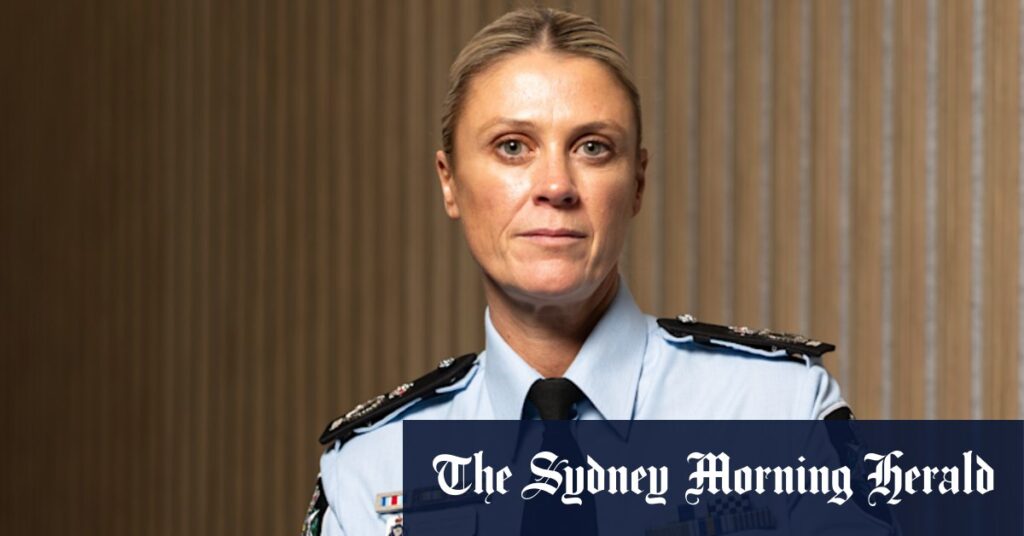
Australia’s newly appointed federal police chief, Krissy Barrett, has issued a stern warning to extremists who are inciting fear and violence at protests. Barrett has prioritized these groups as key targets while she undertakes a comprehensive overhaul of the national police force. This initiative aims to safeguard democracy from chaos instigated by radical actors and rogue states, including Iran.
The announcement comes as tensions flare on the anniversary of the October 7 Hamas attacks, which, along with Israel’s response, have been described as genocide by the United Nations. Barrett, in her first week as the Australian Federal Police’s (AFP) top officer, noted a significant rise in cases driven by ideological hatred.
“We are putting these groups on notice,” Barrett stated during an interview at the AFP headquarters in Canberra. “The way some of these groups are physically presenting at protests is causing fear.”
Barrett emphasized the agency’s commitment to using all available resources, including partnerships and technological capabilities, to maintain social cohesion in Australia. Her approach marks a shift from merely enforcing federal laws to addressing threats fueled by far-right conspiracy theories, online radicalization of youth, and foreign states exploiting encrypted apps to weaponize antisemitism and social unrest.
New Strategies to Combat Extremism
Barrett’s initial directive involves launching national security investigation squads. These units will collaborate with Five Eyes partners and state police to monitor Nazi groups and other radicals, particularly those activated by the Gaza conflict. Although these groups have not yet engaged in terrorist acts, they are potentially violating new hate crime laws, providing the AFP with a new set of targets.
The AFP is increasingly focused on protecting national landmarks in Canberra from vandalism and addressing threats to politicians. A recent incident involved a Queensland man charged with threatening to kill Prime Minister Anthony Albanese on social media.
“These threats are real,” Albanese commented. “We have seen in other countries, in the United States, in the United Kingdom, public figures being targeted.”
Growing Concerns Over Social Cohesion
Barrett expressed concern over local activists increasingly targeting property and businesses based on the owners’ religion. Since October 7, there has been a noticeable impact on social cohesion in Australia, with a rise in hate crimes.
“It’s fear, it’s hatred, it’s humiliation,” Barrett remarked. “Conflict, not just in the Middle East, but also in Ukraine and Russia, is reverberating here in Australia.”
Previously serving as the deputy commissioner overseeing national security, Barrett has introduced a new mission statement that aligns the AFP more closely with the intelligence community. She has instructed her team to focus on defending Australia from both domestic and global security threats, shifting emphasis from traditional concerns like drugs and terrorism to emerging threats against Australian sovereignty and democracy.
Challenges in Policing Emerging Threats
State governments in Australia have been hesitant to enforce laws against violent rhetoric and hate speech. However, the AFP will now take a coordinating role to ensure these laws are prosecuted. The force is already investigating graffiti in Melbourne that glorifies Hamas, as anniversary protests spark legal challenges in Sydney.
Both Barrett and her ASIO counterpart, Mike Burgess, have highlighted the challenges of policing the blurred lines between criminal activity and terrorism. This complexity was evident during the summer outbreak of antisemitic crimes, reportedly funded by Iran.
“States are using criminal proxies to destabilize adversaries,” Barrett stated, highlighting the intersection between criminality and foreign attacks on Australia’s social fabric.
Barrett also noted the increasing danger posed by cyber warfare, particularly from China. In response, Foreign Minister Penny Wong and international counterparts have accelerated cybersecurity measures across the Pacific to counter these threats, though China was not explicitly named.
Political Reactions and Future Directions
Opposition acting home affairs spokesman James Paterson criticized the Albanese government for its delayed response to the rising threats, stating that it should not have taken two years since the October 7 atrocities to institutionalize a response.
“It should not have taken two years since the atrocities of 7 October and the horrific antisemitism it unleashed in Australia for the government to finally institutionalize their response to this crisis,” Paterson said.
As Barrett settles into her new role, the focus remains on adapting to the evolving security landscape and ensuring the AFP is equipped to handle both domestic and international threats effectively. Her leadership marks a pivotal moment for the agency as it navigates the complexities of modern policing in a world marked by geopolitical instability.







